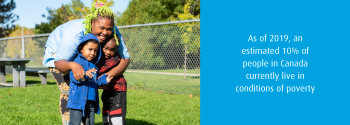Low income and financial instability impact community members across our region and across the country. When a household has to survive on a low income, they can’t always get necessities like food, clothing, and housing. Poverty can add additional challenges, like isolation, loneliness and lack of community. When an individual or family does not have a community of social support in place, it makes it more challenging to go on.

While the more tangible needs such as food and clothing may appear more obvious, these ongoing challenges also affect a person’s well-being in hidden ways.
Children with unmet needs are also likely to experience mental health struggles. This can disrupt their education and impact their likelihood of employment as adults.
These long-term consequences can make it even more difficult to exit the cycle of poverty.
Both mental and physical health can suffer due to low income.
By not being able to afford nutritious food and medications for chronic health conditions, poverty can make poor health worse – and make it more likely that someone who is healthy will have poorer physical health, the longer they are struggling.
Those without nutritious food in their diets are more likely to be diagnosed with diabetes, high blood pressure, and food allergies. Many studies have also reported differences in overall life expectancy between those with high income and those living on a low income. The stress of living without knowing how bills are going to be paid, or how you are going to feed your family can also impact health.
When basic needs are met, individuals have more energy to find creative, long-term solutions to the scarcity they face. Receiving social support and encouragement at a young age builds resilience and equips young people to overcome the challenges they may face.
Stop asking those who are struggling to do the impossible
Poverty Institute Definitions and background causes of poverty
Child Poverty: The Facts You Need to Know Effects of childhood poverty
Just the Facts Statistics and demographics regarding poverty in Canada